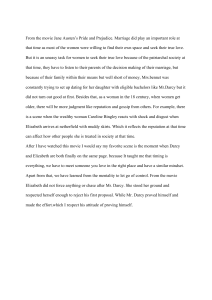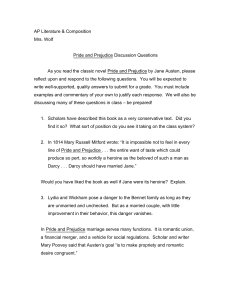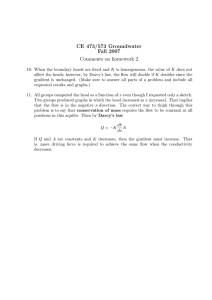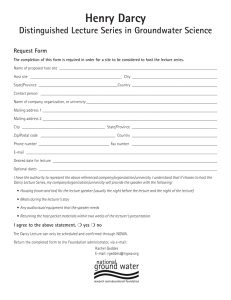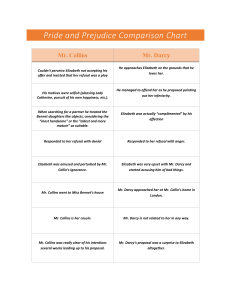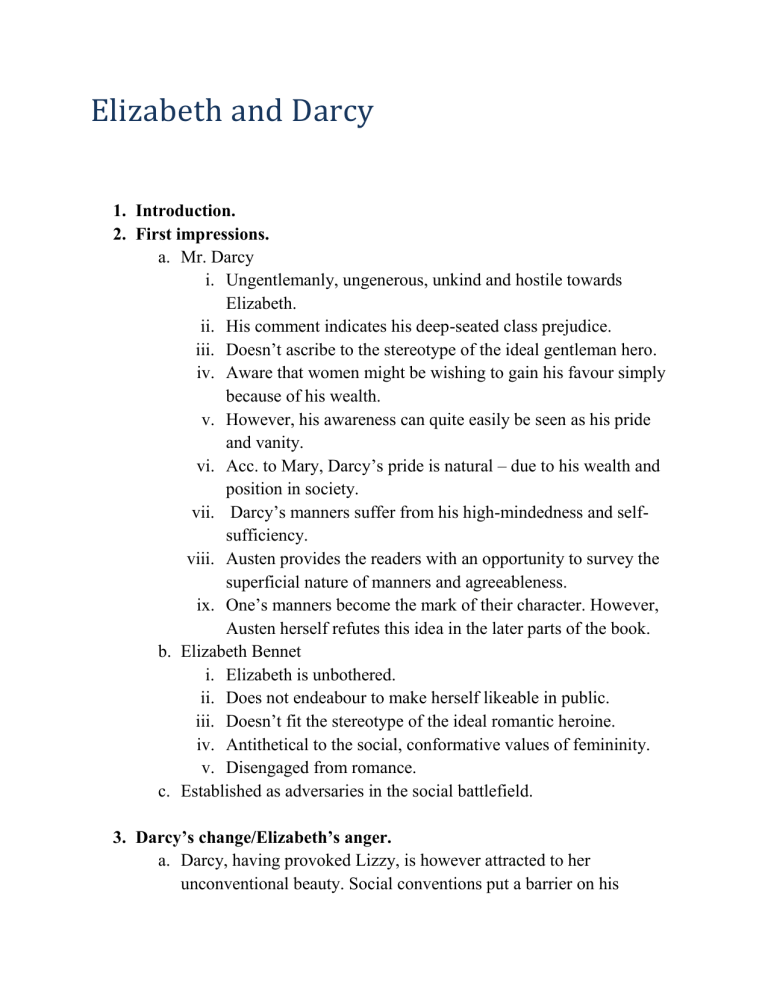
Elizabeth and Darcy 1. Introduction. 2. First impressions. a. Mr. Darcy i. Ungentlemanly, ungenerous, unkind and hostile towards Elizabeth. ii. His comment indicates his deep-seated class prejudice. iii. Doesn’t ascribe to the stereotype of the ideal gentleman hero. iv. Aware that women might be wishing to gain his favour simply because of his wealth. v. However, his awareness can quite easily be seen as his pride and vanity. vi. Acc. to Mary, Darcy’s pride is natural – due to his wealth and position in society. vii. Darcy’s manners suffer from his high-mindedness and selfsufficiency. viii. Austen provides the readers with an opportunity to survey the superficial nature of manners and agreeableness. ix. One’s manners become the mark of their character. However, Austen herself refutes this idea in the later parts of the book. b. Elizabeth Bennet i. Elizabeth is unbothered. ii. Does not endeabour to make herself likeable in public. iii. Doesn’t fit the stereotype of the ideal romantic heroine. iv. Antithetical to the social, conformative values of femininity. v. Disengaged from romance. c. Established as adversaries in the social battlefield. 3. Darcy’s change/Elizabeth’s anger. a. Darcy, having provoked Lizzy, is however attracted to her unconventional beauty. Social conventions put a barrier on his appreciation in the preliminary encounters but now he is quite unable to ignore his growing attraction towards her. b. Elizabeth is, unfortunately, blind to any form of appreciation. Her vision is quite certainly (and one may even say rightly) blurred by her prejudice. 4. Small note on Wickham. a. Wickham appears as an ideal gentleman – foil to Darcy. Establishment of a kind of a love triangle by eliciting Elizabeth’s sympathy by tapping into her already heightened emotions for him and turning her against Darcy – the uncertain credibility of gossip in Regency England; deception by appearance. 5. Darcy’s proposal. a. Lizzie surprised. b. Darcy’s catalogue of all of the reasons why Elizabeth is an unsuitable match for her. c. Darcy is unable to dismiss the underlying material concerns of his marriage to Lizzie. d. Aristocratic pride wounds and affects Lizzie. The proposal, fostered by pride and complacency, is ridiculed by Austen – parody of the burlesque theme of love. e. She wants marriage for love and at the moment Darcy’s behavior is no different from that of Collins. f. She charges him with two offenses: i. Ruination of her sister’s love. ii. Injustice towards Mr. Wickham. g. A personal gulf added to ever-present social divide. h. Lizzie’s refusal - unconventional heroine – but the dangers are still there – radical change for the image of a woman (but she fears Darcy won’t propose to her again because of her refusal at first – does she somewhat fear the wrath of the hurt patriarchal man?) – freedom of choice and agency of the female partner in a relationship – protest against the imposition of old ideals of morality. 6. Darcy’s letter. a. Induces a change of attitude. b. Revision of prejudice against Darcy. c. Darcy’s nobility constantly falsified by Wickham’s falsity and untrue allegations. d. Elucidation of the reasons for his actions – an account of Wickham’s true character with evidences – reason for distancing Bingley – does not appeal to Lizzie’s affection. e. Reaction: i. Lizzie’s disbelief reflects the errors of her prejudice (important quote). ii. Darcy’s pride is matched with her prejudice – these are faults but necessary faults which must be overcome for a desirable marriage. Darcy’s pride originates from a sense of self-respect and dignity and Lizzie’s prejudice from her intelligence, quick wit and insight. Darcy’s pride results in prejudice and Lizzie’ prejudice stems from her pride in her own perceptions. f. Dangers of intellectual complexity and failures of perception. The epistemological chasm is filled by the information from Darcy’s letter. g. Wickham is adjudged to be guilty in all aspects of the term. Reevaluation and self-meditation. h. Darcy possesses inner good qualities. i. A critique upon the way in which information gets muddled n the realm of 19th century domestic gossip. 7. Elizabeth’s doubt. a. By accepting Wickham on face value Lizzie repeats the follies of the 18th century heroines. She realizes how badly she has treated Darcy. b. Pemberley Park – a metaphorical representation of Mr. Darcy. Nature is retained despite apparent pomp – Darcy’s manners being impeccable despite his apparent rudeness. His good character is justified by Mr. Reynolds. Lizzie’s inner monologue. c. Darcy’s unselfish actions endear him to Lizzie. 8. Darcy’s actions and second proposal. a. All marriages have contradictions in them, but Darcy and Lizzie’s are overcome by them. b. “Forces do not meet and resolve. They constantly shift and dissipate rather than clash.” “The reductions of pride and prejudice always cause grief, and Elizabeth learns to recognize and overcome the limitations of hu- man vision which threaten her happiness.” “Elizabeth's marriage to Darcy, after she has sorted out her feelings, is not a rejection of her values but a fulfillment of them.” – “Pride and Prejudice in Pride and Prejudice” by Everett Zimmerman.0 9. Conclusion.
